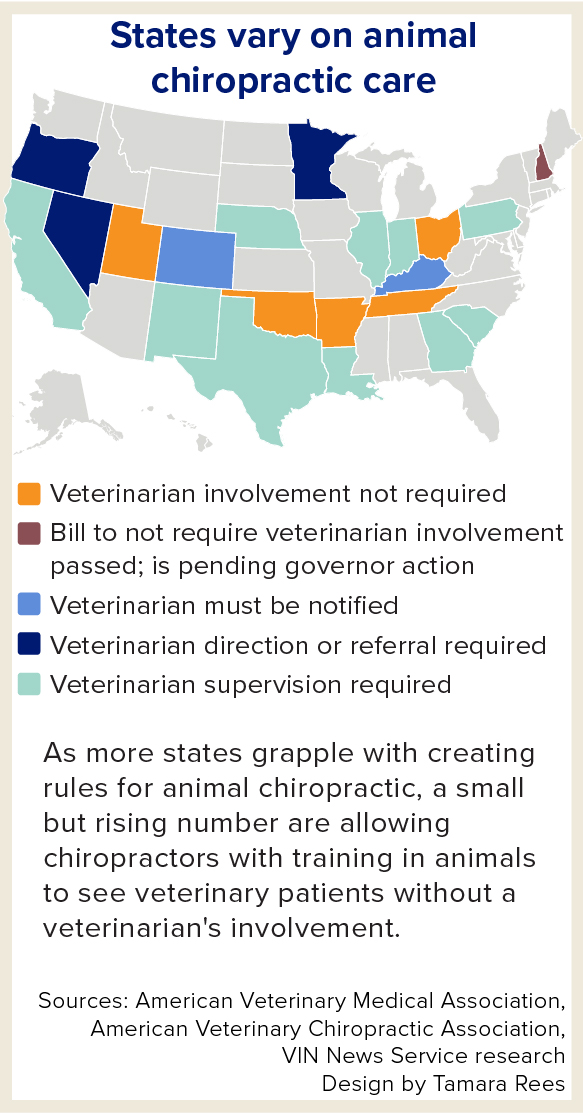 Listen to this story.
Listen to this story.
Revised chart to address the gray

Chiropractors in Tennessee may treat animal patients without having to coordinate care with a veterinarian under a law signed this month. New Hampshire is poised to take a similar approach.
Legislation seeking similar arrangements failed in Mississippi, while bills in California and Maine are on pause following vigorous campaigns against them by veterinary organizations.
Following the burst of legislative proposals, the number of states that allow chiropractors to see animal patients without involving veterinarians is five; New Hampshire is a prospective sixth. In addition to Tennessee, states in that category are Arkansas, Oklahoma, Ohio and Utah.
Veterinarians often, though not always, resist efforts to allow chiropractors to independently work on animals, given that chiropractors' education in musculoskeletal manipulation is centered on human patients. States that allow chiropractors to see animals without a veterinarian's involvement require that they obtain animal-specific training. Critics say proper care is more complicated than can be learned through supplemental coursework.
Dr. Cindy Schmidt, president of the Tennessee Veterinary Medical Association, which unsuccessfully fought the bill in that state, put it this way: "After completing ... at best, several weeks of animal-related courses, that they feel they have an understanding of the unique anatomy and physiology of animals — we just don't feel like that gives them the proper background to diagnose and treat some of the conditions that they will be treating."
As an example, abdominal pain can look deceptively like spinal pain, she said. "The animal maybe walks with a hunched posture and exhibits other obvious signs of back pain, and it really has nothing to do with that."
Or the patient may have back pain not from a spinal alignment problem but from an infection of the spine, Schmidt said.
A letter of opposition to the bill in California from the American Veterinary Medical Association, the California Veterinary Medical Association and three regional associations in the state raised the same and related concerns.
It reads in part: "[I]f a human suffers a health emergency on a chiropractor's premises, the chiropractor can call 911 .... Because there is no 911 equivalent for animals, animals experiencing a health crisis resulting from or occurring during chiropractic treatment will not receive emergency care if treated at a facility that does not have veterinary licensees present."
In New Hampshire, Rep. Diane Kelley is a sponsor of that state's bill to allow animal chiropractors to work independently. The bill was approved by lawmakers and is awaiting action by the governor. Kelley said the animal chiropractors she's known and used for her own pets — including in California — have been well-trained in nonhuman patients and know to be watchful for non-chiropractic underlying conditions.
Chiropractors in New Hampshire currently offering their services to animal patients exist in a "gray area," Kelley said, because the law does not spell out their authority, leaving them vulnerable to reprimand by the state veterinary board. "People have been afraid to advertise or expand their practices," she said.
The pending law in New Hampshire exempts providers with a degree in either veterinary medicine or chiropractic from veterinary licensing requirements if they have "completed a nationally recognized animal chiropractic program as determined by the executive director" of the state's Office of Professional Licensure in consultation with its veterinary and chiropractic boards.
Certification in animal chiropractic is available through organizations such as the American Veterinary Chiropractic Association (AVCA). The credential is available to chiropractors as well as veterinarians — who generally don't learn chiropractic practices in veterinary school. Becoming AVCA-certified entails completing at least 210 hours of coursework and passing an exam. Certification is subject to renewal every three years; maintaining the credential requires continuing education.
According to the AVCA, its number of certificants has grown by 33% in the past four years, totaling about 1,250 practitioners in North America today. Of these, 58% are chiropractors and 42% are veterinarians. (Three have degrees in both disciplines.)
Schmidt, the Tennessee Veterinary Medical Association president, said chiropractic care is valuable and appropriate if provided as part of the patient's overall veterinary care. "It is definitely a tool that brings a lot of relief to not just small animals — dogs and cats — but large animals as well, horses in particular," she said.
"If a veterinarian refers a patient to a human chiropractor, that's great, and a lot of vets do that," Schmidt said. "They work in a collaborative way with human chiropractors, but that's after the patient has been completely and thoroughly examined."
Dr. James Israelsen, a veterinarian certified in animal chiropractic since 2002, said that in his experience, providers in both disciplines work collegially regardless of government requirements. In his state, Utah, which in 2021 began allowing animal chiropractors to practice independently of veterinarians, Israelsen said, "We have had no issues of which I'm aware, and the animal chiropractors understand that it is in their best interest to work with veterinarians."
Israelsen recalled that much of the training he received to become certified was devoted to recognizing conditions that are not animal chiropractic issues and should be referred to a veterinarian. (When he's working as an animal chiropractor, which is about 25% of the time, Israelsen said, he coordinates with the patient's regular veterinarian.)
A former AVCA president and current member of its legislative committee, Israelsen said he understands the concern of some veterinarians that chiropractors, as ancillary animal care providers, might miss something important. He noted that the opposite is also true. "Veterinarians who have no animal chiropractic training in states that require direct supervision, they are essentially liable for the work of that animal chiropractic professional that they are overseeing, and yet they have no way to know if that person is safe and efficacious because they're not trained in chiropractic," he said.
Supervision by veterinarians of animal chiropractors is required in 10 states, judging from information provided to the VIN News Service from the AVMA and AVCA. The states are California, Georgia, Illinois, Indiana, Louisiana, Nebraska, New Mexico, Pennsylvania, South Carolina and Texas.
In Minnesota and Oregon, chiropractors may work on animals with a veterinarian referral, while Nevada calls for veterinarian "direction." In Colorado, a chiropractor must notify the patient's primary care veterinarian when initiating treatment.
In Kentucky, animal chiropractic providers come under a relatively new "allied animal health professional" category. Created as part of an extensive update to the state veterinary practice act in 2023, the category was broadened by a law passed this spring to encompass equine dental providers (colloquially known as teeth floaters). The credential also was changed from a permit to a license. Allied animal health professionals are overseen by the Kentucky Board of Veterinary Examiners, and chiropractors must communicate their findings with the patient's veterinarian within three days of providing services.
Of the three states where bills giving chiropractors more access to animal patients did not pass, one — in California — was pulled just before a scheduled public hearing last week due to opposition from the veterinary profession.
"We want to work with some amendments to get the bill where it needs to be," explained Ivette Burch, communications director for the author, Sen. Rosilicie Ochoa Bogh. Burch said the bill will not be considered by lawmakers again before 2026.
Similarly, in Maine, where a bill to allow chiropractors to work on dogs and equids (such as horses) has drawn marked resistance among veterinarians, the sponsor, Rep. Robert Foley, stated at a public hearing in April, "There is additional work that needs to be done as the parties work collaboratively to improve the proposal’s language." The legislative committee considering the bill tabled, or deferred, action.
In Mississippi, legislation to allow chiropractors to perform chiropractic treatment on animals without the supervision of a veterinarian died in committee in February.
Update: On May 16, New Hampshire Gov. Kelly Ayotte signed HB 267 into law, enabling chiropractors with specified training in animals to practice in the state without the involvement of veterinarians.